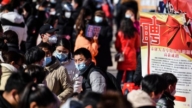【新唐人2011年4月18日讯】拆迁是中国大陆人民流不完的泪,上周,山东和四川又传出为了拆迁而引发的群众抗争事件。有学者指出,中共统治下的强拆,把全中国的财产关系带入空前的混乱,这在将来中共独裁消失后,将是一笔剪不断、理还乱的糊涂账。
据《自由亚洲电台》的消息,山东德州市,因土地开发利益分配问题,上周四,发生群众抗争事件,开发商在当地土地开发项目上,排斥村民参与物资供应,而成为数百村民抗议的导火线。当局派出七八十人的公安防暴队,暴力驱散民众,并当场抓捕了四名村民。
村民告诉《自由亚洲电台》,当地政府压低了赔偿费,土地被征用了,利益却不分给农民。
四月初,曾有村民在互联网上提出,德州市乐陵市五里塚村征收土地的七个疑问,村民质问:几年前,村后的土地已经每亩3.5万甚至4万,如今却只赔偿3万元﹔而德州市的文件是:盛果期枣树每棵补偿300—600元,而五里塚村却只赔偿每亩500元。
另外,去年另一个镇的枣农,也经历被强行征地。
魏先生(山东德州市枣农):“一亩地三万块钱,你不要也不行,公检法都来对付你,你不愿意就把你的树一夜之间拔光,什么也不管,(居民)就跟狗一样无保障,三无!我们现在的人都是三无。都在征地、开发啊!盖商品楼。”。
另一方面,在四川成都,近千名龙桥镇居民,向政府追讨征地赔偿时,被大批警察包围,武力镇压,20多人被扣押,10多人被打伤,很多居民担心被捕,到处躱避,不敢回家。
一位龙桥镇居民向《自由亚洲电台》透露,他们三年前被征地拆迁后,居民没有获得赔偿及安置。上星期二镇政府召集居民讲解赔偿问题,却只宣读一份在多年前发表的政策文件,并要所有人15分钟内清场。官员说:“你们爱告到哪里?就哪里!”。居民在广场静坐抗议,但不久之后,有超过二十辆巴士,载着大约八百多名的防暴警察和政府雇用的保安到场,以扰乱秩序为名驱赶居民。
六四学生领袖王丹在《台湾与大陆的征地纠纷体现了制度的差别》文章指出,在台湾,国民党会担心选票的流失,而选择放弃发展计划,维护2%反对拆迁居民的权益。但在中国大陆,面对土地纠纷,地方政府没有制度上的任何硬约束,一旦群体性事件扩大,他们还可以以社会稳定为理由,要求中央政府以国家暴力来解决利益纠纷。
《北京之春》杂志主编胡平也在《拆迁征地之战——抢钱与反抢钱》文章上说,虽然强拆事件是开发商和政府勾结,但是按照全国政协委员、广州富力地产总裁张力在两会上的发言,地方政府卖地的利润高达200%,而开发商的利润只有10%。
他指出:一旦中国走上民主之路,面对空前规模的财富分配不公,清理工作将极其复杂极其繁重。如果说中共当年的革命是第一次抢劫,尔后的改革则是第二次抢劫。这两次大抢劫已经把全中国的财产关系带入空前的混乱。我们可以想像的是,一旦中国民主了、法治了,仅仅是围绕着土地和住房,就该有多少打不完的官司和理不清的产权。
新唐人记者吴惟、王明宇综合报导。
Forced Demolitions, Bane of China?
Forced demolitions are Chinese people’s pain.
Last week, forced demolitions occurred again
in Shandong and Sichuan, arousing mass protests.
Experts said, forced demolitions brings China’s
property relations into chaos and it is a debt
which can hardly be cleared up after the fall of CCP
(Chinese Communist Party).
According to Radio Free Asia (RFA), last Thursday,
mass protests happened in Dezhou, Shandong,
for an unequal distribution of revenue from
land development. Developers rejected villagers’
material supply in land development projects,
arousing reaction among hundreds of villagers.
The authorities sent a riot team of 70-80
to disperse people violently, arresting 4 on the spot.
Villagers told RFA, that the local government
tried to lower the damage by utilizing the land,
but it still refused to give villagers compensation.
At the beginning of April, a villager asked online
questions on land requisition in Wulizhong, Dezhou.
He questioned, several years ago, the land
behind the village was worth RMB35,000-40,000
per mu, but now it is only RMB30,000. Dezhou’s;
official document promised to pay RMB300-600
for each jujube tree during full bearing period
but Wulizhong Village only got RMB500 per mu..
Also, jujube growers in another town
experienced forced requisition.
Mr. Wei (jujube grower in Dezhou, Shandong):
“You have to accept the deal of RMB30,000 per mu,
otherwise public security, procuratorial organs
and courts will make troubles, destroy all the trees
unscrupulously. We residents are like dogs, with no
security or anything! We normal people have now
almost no rights. They are all requisitioning and
developing land and building commodity houses.”
On the other hand, nearly 1000 Longqiao Town
residents were surrounded and forcibly repressed
by police when they were asking the government
for land compensation. Over 20 were detained,
more than 10 were hurt. Many residents
are afraid of being arrested and cannot go home.
A Longqiao Town resident told RFA, their land was
requisitioned three years ago with no compensation
or settlement. Last Tuesday, Town Government
gathered residents for compensation issues, but
ended up reading an official document released
several years ago and asking everyone to leave in
15 minutes. The officials said: “You can appeal to
whomever you want!” Residents went on a sit-down
protest, but over 20 buses came soon with around
800 riot policemen and security men who dispersed
residents with the excuse of disturbing social order.
The student leader of June 4th Incident, Wang Dan,
wrote in an article “The Land requisition in Taiwan
and China shows different political systems,”
that Taiwan’s Nationalist Party, afraid of losing votes,
will give up a development plan to protect the rights
of 2% of people who disagree. But in China, local
governments don’t have any rigid limitations facing
land disputes. Once a mass disturbance expands,
they can ask the central government to solve the
dispute by forcing social stability on the ground.”
Hu Ping, Editor in Chief of Beijing Spring, wrote in
the article “A war of land requisition, to rob and
to protect,” that though forced demolitions are result
of developers and government’s collaboration,
local governments get 200% profit while developers
only get 10%, according to Zhang Li’s (a CPPCC
member and CEO of Guangzhou Fuli Real Estate)
speech during CCP’s ’two conferences.’
Hu said: “Once China adopts democracy, the
clearance of this unprecedented unfair distribution
of wealth will be very complicated and heavy.
CCP’s previous resolution of first rob then reform
has brought China’s property relations to
unprecedented chaos. It is conceivable that
once China adopts democracy under the rule of law
there will be countless lawsuits and complicated
property issues to solve, about land and houses.”
NTD reporters Wu Wei and Wang Mingyu































